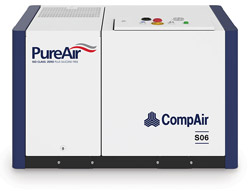
Posted to News on 6th Jan 2020, 14:31
How to choose the right air compressor
Air compressors are valuable for industrial use, including powering pneumatic tools and pumping up tyres. But with so many models on the market, how can you make ensure you make the right decision for the application at hand? Direct Air has created an informative guide on how to make this decision: follow the link for full information and a helpful infographic on how a Hydrovane series rotary sliding vane air compressor works.

All air compressors require lubrication to safely and efficiently draw air into the cylinder and this can be achieved in one of two ways: oil-based and oil-free.
Oil-free compressors
These types of compressors are popular when dealing with items that need guaranteed oil-free output, such as food. But they are also becoming popular due to their low maintenance, running costs and minimal energy usage. They are also typically a lighter compressor so tend to be more suitable for portable applications.
Oil-free air compressors use a non-stick coating, typically Teflon, to achieve this. These are easier to maintain as it eradicates frequent maintenance checks to ensure sufficient oil; they also have fewer elements than their oil-lubricated counterparts making them more lightweight. They can also help to reduce your carbon footprint by eliminating the need for this fossil fuel. In addition, they do not release contaminants into the environment either. Follow the link for a range of oil-free air compressors.
Oil-free compressors can also reduce operating costs by reducing any cost involved in disposing of oil condensate, as well as filtration systems that are needed to remove oil aerosols. Air compressors typically need a lot of looking after, requiring constant oil changes. This is not the case with oil-free, but ensure that the tank is emptied after each use to avoid water vapour condensing inside. Any condensate built up from oil-free compressors can often be recycled elsewhere within the plant, increasing its efficiency.
However, oil-free air compressors have a shorter lifespan, as this non-stick coating will eventually wear away and need replacing. For larger applications, an oil-based machine is best suited.
Single-phase and dual-phase compressors
These are the most common form of air compressors and they function in the same fundamental way. Dual-phase simply has one more step to the process.
In a single-phase, the air is drawn into the cylinder with the use of a single-piston movement and compressed to roughly 120psi and sent to a storage tank, awaiting use. Dual-phase follows these steps but the air is compressed a second time, in a second cylinder, to a rate of roughly 175psi.
Dual-phase devices are typically more robust and therefore better suited to industrial environments. As single-phase compressors have fewer components, they are lighter and more compact, making them useful for portable applications.
Fixed and variable-speed compressors
Another factor to consider is the speed of your motor. A fixed-speed air compressor powers the motor at a constant speed until the storage tank is full. In return, you are provided with a reliable frequency from a machine that is also easier to maintain.
A variable-speed compressor allows you to easily control the power and use only what you require. Therefore, they are more energy-efficient and can reduce your impact on the environment and your energy bill. They are, however, not best suited for applications that require a continuous stream of power.
Low-noise air compressors
A common complaint about air compressors is the noise they make, which can affect workers. Investing in a low-noise air compressor can protect your staff and avoid distraction.
These machines reduce noise levels to around 40dB; in comparison, 60dB is considered the safest decibel levels for air compressors, and anything over 85dB can cause long-lasting damage to hearing. Low-noise air compressors achieve their reduced dB level with the addition of an acoustic chamber to contain the noise.
Visit www.directair.co.uk to learn more.
Want the latest machine building news straight to your inbox? Become a MachineBuilding member for free today >>
Unit 38, Herald Way
Binley Industrial Estate
CV3 2RQ
UNITED KINGDOM
+44 (0)24 7668 8890

















